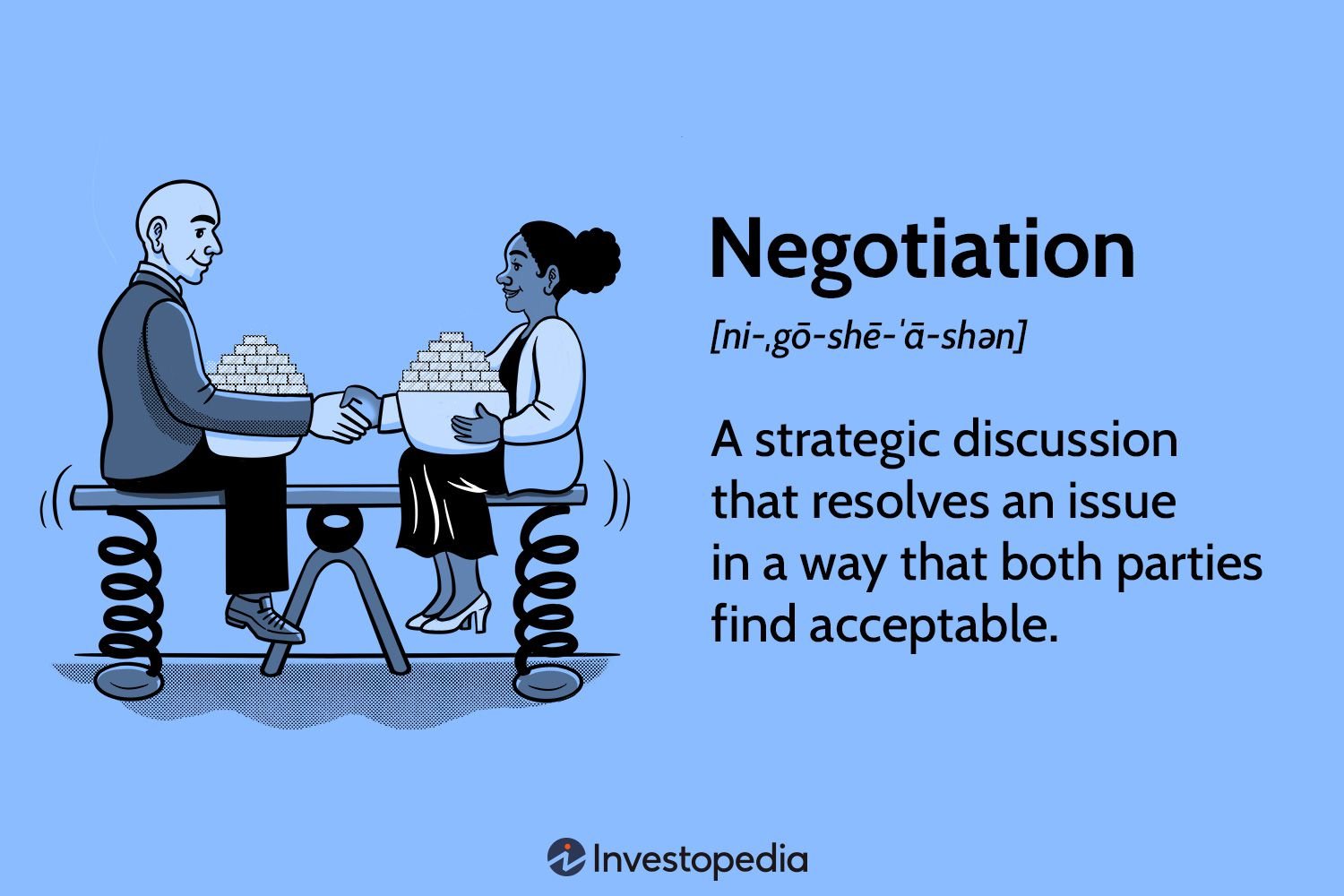Looking to negotiate terms in a business deal? You’re in the right place! Negotiating is a crucial skill in the world of business, and mastering it can significantly impact your success. In this article, we’ll explore practical strategies and techniques that will empower you to navigate the complexities of deal-making with confidence. From understanding the needs and priorities of both parties to finding creative win-win solutions, we’ll cover it all. So, if you’re ready to enhance your negotiation prowess and secure favorable terms in your next business deal, let’s dive right in!
How to Negotiate Terms in a Business Deal
Introduction
Negotiating terms in a business deal can be a complex and challenging process. It requires careful planning, effective communication, and strategic thinking. Whether you are a business owner, entrepreneur, or professional, having the skills to negotiate favorable terms can greatly impact your success. In this article, we will provide you with a comprehensive guide on how to negotiate terms in a business deal, covering key strategies, techniques, and best practices. By following these guidelines, you will be better equipped to achieve mutually beneficial outcomes and secure favorable terms in your future business deals.
Understanding the Negotiation Process
Before diving into the specifics of negotiating terms, it’s essential to have a solid understanding of the negotiation process itself. Negotiation is a dialogue between two or more parties with the goal of reaching an agreement that satisfies everyone involved. Here are the key stages of the negotiation process:
1. Preparation: This stage involves gathering information about the other party, identifying your goals, and developing a negotiation strategy. It is crucial to be well-informed about the industry, market trends, and the other party’s position.
2. Opening: During the opening stage, both parties present their initial proposals and set the tone for the negotiation. It is essential to establish rapport and build trust while clearly stating your objectives.
3. Exploration and Bargaining: This stage focuses on exchanging information, exploring options, and bargaining for mutually acceptable terms. Active listening and effective communication play a crucial role in this phase.
4. Agreement: Once both parties have reached a consensus on the terms, they formalize the agreement. This stage involves finalizing the details, drafting a contract, and ensuring that all parties are satisfied.
Key Strategies for Negotiating Terms
Negotiating terms in a business deal requires a strategic approach. Here are some key strategies to help you navigate the negotiation process successfully:
1. Define Your Objectives
Before entering into negotiations, clearly define your objectives and priorities. Identify what you want to achieve from the deal. This will provide you with a clear focus and help you stay on track throughout the negotiation process.
2. Understand the Other Party’s Perspective
To negotiate effectively, it is crucial to understand the other party’s perspective. Put yourself in their shoes and try to empathize with their goals and concerns. This will allow you to tailor your approach and propose solutions that address their needs.
3. Gather Sufficient Information
Knowledge is power in negotiations. Conduct thorough research on the industry, market conditions, and the other party involved. Gather as much relevant information as possible to support your arguments and strengthen your position.
4. Build Rapport and Establish Trust
Building rapport and establishing trust is essential in any negotiation. Take the time to develop a positive relationship with the other party. Listen actively, show empathy, and maintain open lines of communication. This will create a conducive environment for reaching mutually beneficial agreements.
5. Focus on Interests, Not Positions
Negotiations often revolve around positions, but it is essential to understand the underlying interests behind those positions. By focusing on common interests, you can explore creative solutions that meet the needs of both parties. This approach allows for more flexible and favorable terms.
6. Use Active Listening and Effective Communication
Effective communication is key to successful negotiations. Practice active listening to understand the other party’s perspective fully. Clearly articulate your thoughts, needs, and concerns. Be concise, confident, and persuasive in your communication.
7. Be Willing to Compromise
Negotiation is a give-and-take process. Be prepared to make concessions and find compromises that benefit both parties. Flexibility and openness to alternative solutions can lead to more favorable terms.
8. Leverage Multiple Alternatives
Having multiple alternatives gives you leverage in negotiations. Explore different options and alternatives to strengthen your position and create more negotiation opportunities. This will provide you with a sense of security and prevent you from settling for unfavorable terms.
9. Seek Win-Win Solutions
Strive for win-win outcomes in negotiations. Look for solutions that create value for both parties involved. This collaborative approach fosters long-term relationships and lays the foundation for future business dealings.
10. Remain Patient and Persist
Negotiations can be time-consuming and challenging. It is crucial to remain patient and persistent throughout the process. Stay focused on your objectives, and be prepared to adapt your strategy as needed. Remember that negotiation is a marathon, not a sprint.
Negotiating Specific Terms
In addition to the overall negotiation strategies, it is important to address specific terms that commonly arise in business deals. Here are some key terms that often require negotiation:
1. Price and Payment Terms
Price is a crucial aspect of any business deal. Negotiating the price and payment terms involves finding a balance that is acceptable to both parties. Consider factors such as cash flow, volume discounts, installment payments, and any applicable penalties or incentives.
2. Delivery and Performance Obligations
Clearly defining delivery and performance obligations is essential to avoid any future disputes. Negotiate the timeframe, quality standards, and any specific requirements related to the delivery of goods or services. Determine the consequences for any potential delays or breaches.
3. Intellectual Property Rights
Intellectual property rights are often a critical aspect of business deals, especially in technology-driven industries. Negotiate the ownership, licensing, and usage rights of intellectual property assets to protect your interests and ensure clarity in the agreement.
4. Confidentiality and Non-Disclosure
Confidentiality and non-disclosure agreements are crucial to protect sensitive information shared during the negotiation and throughout the business relationship. Ensure that appropriate provisions are included to safeguard confidential data and prevent unauthorized disclosure.
5. Termination and Dispute Resolution
Negotiating termination and dispute resolution provisions can save a lot of time, effort, and potential legal costs in the future. Define the circumstances under which the agreement can be terminated and establish a clear process for resolving disputes, such as mediation or arbitration.
Negotiating terms in a business deal is an art that requires careful planning, effective communication, and strategic thinking. By following the strategies outlined in this article and addressing specific terms with diligence, you can significantly increase your chances of securing favorable outcomes. Remember that negotiation is a collaborative process, and focusing on win-win solutions creates long-term value for all parties involved. With practice and experience, you can become a master negotiator who consistently achieves mutually beneficial results in your business deals.
How to Negotiate (or, "The Art of Dealmaking") | Tim Ferriss
Frequently Asked Questions
Frequently Asked Questions (FAQs)
How do I negotiate terms in a business deal?
When negotiating terms in a business deal, follow these steps to increase your chances of success:
What is the first step in negotiating the terms of a business deal?
The first step in negotiating the terms of a business deal is to thoroughly understand your own objectives and desired outcomes. Clarify what you want to achieve and set realistic expectations.
How can I create a win-win situation during negotiations?
To create a win-win situation, focus on understanding the other party’s needs and concerns. Look for creative solutions that address both parties’ interests and explore potential trade-offs.
What should I consider before entering into negotiations?
Before entering into negotiations, consider factors such as your leverage, the value of the deal, your alternatives, and the other party’s interests and priorities. Being prepared will give you an advantageous position.
How can I effectively communicate my terms during negotiations?
During negotiations, clearly and assertively communicate your terms while also actively listening to the other party. Be specific about what you want and explain the rationale behind your proposals.
What strategies can be used to influence the negotiation process?
Some effective strategies to influence the negotiation process include building rapport, using persuasive language, providing evidence to support your arguments, and proposing mutually beneficial solutions.
How do I handle disagreements or conflicts during negotiations?
Handling disagreements or conflicts during negotiations requires maintaining a professional and calm demeanor. Listen actively, seek to understand the other party’s perspective, and explore options for compromise.
Should I involve a third-party mediator in the negotiation process?
In certain situations, involving a third-party mediator can be beneficial to facilitate productive discussions and help reach a resolution. Consider this option if communication channels have broken down or if there is a deadlock.
What should I do after reaching an agreement on the terms?
After reaching an agreement on the terms, ensure that all the agreed-upon terms are clearly documented in a written contract. Review the contract carefully before signing and seek legal advice if necessary.
Final Thoughts
Negotiating terms in a business deal can be a complex process, but with the right approach, it can lead to a win-win outcome. First and foremost, it is crucial to thoroughly understand your own needs and objectives, as well as those of the other party involved. Open and clear communication is key, establishing a solid foundation for the negotiation. It is essential to remain flexible and adaptable while staying firm on your key points. By actively listening and finding common ground, a mutually beneficial agreement can be reached. Preparation, effective communication, and a focus on problem-solving are the essential ingredients to successfully negotiate terms in a business deal.



